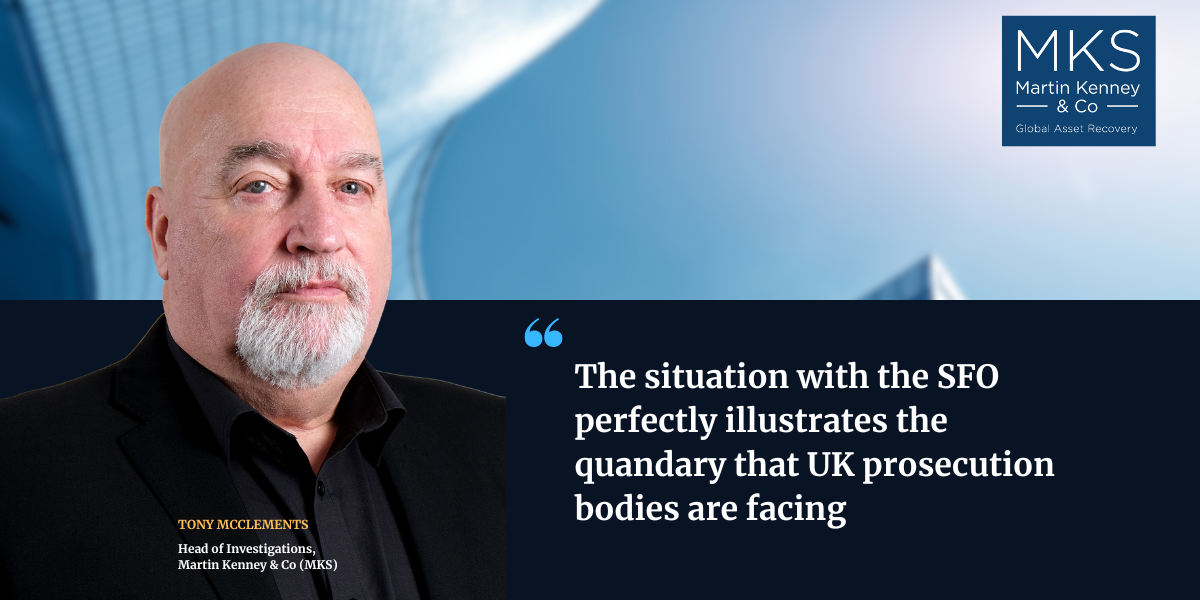The contrast between the Serious Fraud Office’s cases and the prosecution of “Crypto King” Sam Bankman-Fried highlights the stark differences between the UK and the US when it comes to prosecutorial expedition.
When investigating criminal matters in the UK, particularly fraud, the issue of disclosure under the Criminal Procedures and Investigations Act 1996 (CPIA) can be problematic.
The Serious Fraud Office (SFO) appears to have been at the threshold of charging at least some of the suspects in one of its recent cases, only for it to receive a further significant tranche of documents causing it to move its original charging decision back nine months.
This decision will be equally frustrating for defence teams and their clients. This case and its potential prosecution have been hanging over the heads of the defendants for some time. Likewise, this frustration will be shared by the SFO team, who are now faced with another mountain of material, the vast majority of which is likely to fall into the category of the unused and irrelevant.
However, the CPIA is specific in the duties it imposes on the prosecution. The prosecution must sift through the material to identify, among other things, not only evidence that would support a prosecution but anything that would assist the defence or would undermine the prosecution’s case.
Lawyers who specialise in bringing fraudsters to justice outside the UK may find this a little draconian. But nonetheless, the CPIA contains fundamental pre-trial disclosure rules that must be followed in criminal prosecutions. They are there to protect the defendant, having their historical basis in cases where the police buried evidence that would have likely resulted in prosecutions being dropped, or acquittals.
By comparison, former head of FTX crypto exchange Sam Bankman-Fried was recently found guilty of an $8 billion “misappropriation of client value” fraud connected to his control of FTX. It has taken the US Department of Justice around 11 months to bring this case to fruition, from arrest to prosecution. This is an astonishingly speedy process. Indeed, it so quick that I am confident that non-US criminal investigators and lawyers may even be feeling slightly uncomfortable at its expedition. This is not a criticism of the US system, simply an observation.
However, the situation with the SFO perfectly illustrates the quandary that UK prosecution bodies are facing. My own view is that CPIA is no longer fit for purpose. It was never conceived to deal with the amount of digital data that businesses now generate. Indeed, the year that CPIA was enacted, 1996, was the first year that the US saw more emails sent than paper mail. In effect, CPIA was heading towards being outdated the very year it was enacted.
The fact that any charging decision is going to be delayed so significantly is indicative of the problems both sides face in any SFO case, and is due primarily to the impact that CPIA has on complex fraud cases.
Is it reasonable to expect law enforcement to sift through millions of pages of documents, physical and digital, and then to vilify them if they miss something relevant?
Yet the defence rightly expects the prosecution to bring to its attention anything that would assist their client’s defence, as nobody wants to see a miscarriage of justice. This said, the onus being placed on the prosecution team is huge and, to my mind, is now becoming unreasonable.
Remember, too, that in cases where legal aid is being provided, the British taxpayer is paying for both sides: prosecution and defence. There have to be changes made to the process. Perhaps amendments to the Act, or even a new Act to replace it, that caters not only to the challenges that prosecutors now face, but also to future-proof the process for the technologies to come.
There is a public interest element that is often overlooked. The public has the right to a fair trial as much as the defendant. They cannot expect this if the prosecution is fighting with one hand tied behind their backs. The public also has the right to expect that their taxes are not being squandered on processes that are decades out of date in the context of today’s technology.
I cannot offer a simple solution: I’ll leave that to the lawyers to thrash out. But the contrast between the prosecutorial speed inherent in the Bankman-Fried case and those of a similar ilk in the UK is stark. Can the UK learn from the US … or does the US need to learn from the UK?
Tony McClements is Head of Investigations at Martin Kenney & Co (MKS)

